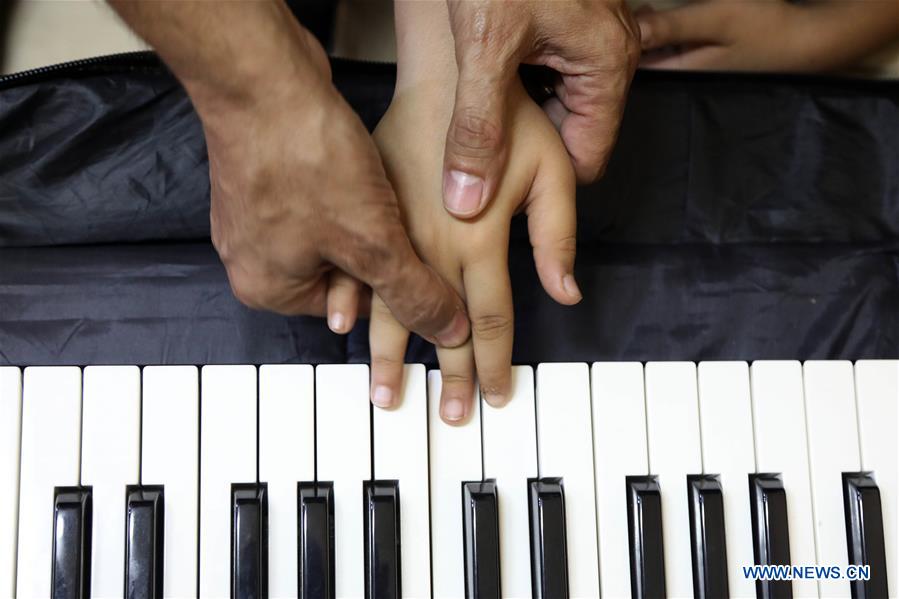
A child is given a musical therapy at Hope City Foundation in Cairo, Egypt, Oct. 13, 2020. (Xinhua/Ahmed Gomaa)
by Mahmoud Fouly
CAIRO, Oct. 15 (Xinhua) -- At an open-air theatre in Egypt's Cairo Opera House, with a colorful lighting stage background, audience held their breath while nearly 40 female blind performers played music masterpieces a few days ahead of the White Cane Safety Day.
The White Cane Safety Day is celebrated worldwide on Oct. 15 every year to raise world's awareness on the contribution of blind and visually impaired people to their societies.
Cheers and applause overwhelmed the Cairo Opera House after each piece that Al-Nour Wal Amal Orchestra elegantly and perfectly played.
"On this day, I would like to tell everyone with any disability to be persistent and never give up," Mariam al-Nagdy, a 26-year-old violinist who joined the orchestra in 2008, told Xinhua after the performance.
The orchestra belongs to the Cairo-based Al-Nour Wal Amal (Light and Hope) Association, whose music institute was established in 1961, seven years after the establishment of the association.
"In 1988, our orchestra accepted an invitation to perform in Austria. It was such a successful trip that Austrians described our girls as 'the fourth pyramid of Egypt'," said Amal Fikry, the association's deputy chief and head of its music institute.
Al-Nour Wal Amal Orchestra then toured at least 30 other countries across the world, the latest of which was China in 2017.
Nour Ahmed, a senior university student, travelled from the Egypt's northern seaside province of Alexandria to Cairo to watch the performance.
"They are so beautiful and talented and their performance is breathtaking," the 18-year-old student told Xinhua, adding that "they inspire everyone that there's nothing impossible."
Al-Nour Wal Amal and all similar foundations in Egypt are approved and supervised by the Ministry of Social Solidarity.
One of these associations is Hope City Foundation (HCF), which provides rehabilitation services to deaf-blind children as well as those with multiple disabilities, including those with both autism spectrum disorder and visual impairment.
Located in the ground floor of a building in Cairo, HCF has several small classrooms with attractively colored walls, toys and entertainment and educational tools, including rooms for speech therapy, music therapy, physical education and Braille system for touch reading and writing.
Officially approved in 2014, the foundation also has a room for early intervention for babies with multiple disabilities to improve their visual, hearing and touching skills, and a vocational room with a large loom and a number of small carpets and tapestries.
At the end of the main corridor inside HCF, 10-year-old visually impaired boy Mahmoud Khaled was singing an Egyptian traditional song at the music room while his music therapist was playing the accompanying notes on a keyboard.
Khaled joined HCF about six years ago and his case gradually improved until he joined a public school with normal children.
His mother Abla Sayyid, who was waiting for him, said that the boy was visually impaired since he was 14 days old and after Khaled became one year old, they realized that he was speechless and hyperactive.
"On this occasion, I would like to tell the families of visually impaired children not to give up hope. Look how my son was and how he is now. I am so proud of him," Sayyid told Xinhua.
"Our goal is to provide high quality education and rehabilitation to children and adults with visual or hearing disabilities along with or without additional disabilities," said HCF Chief Amal Ezzat, who studied in Norway and joined a scholarship in the United States.
Ezzat launched a campaign calling for the right of visually impaired children with additional disabilities to join public schools. Egypt's Ministry of Education responded with a ministerial decision in 2019 and specified special classes with trained teachers at some government schools for this purpose.
"They have the right to receive high quality education ... It's their right to be treated as equal to all other children," added Ezzat, who was also a speaker at a ceremony held on Wednesday at the Cairo-based Arab Council for Childhood and Development to mark this year's White Cane Safety Day. Enditem